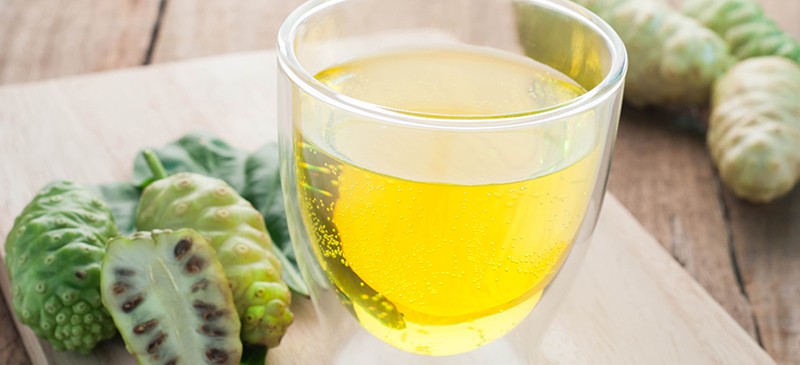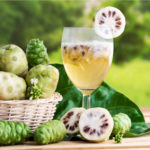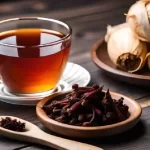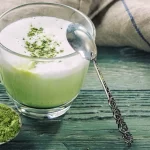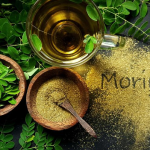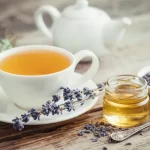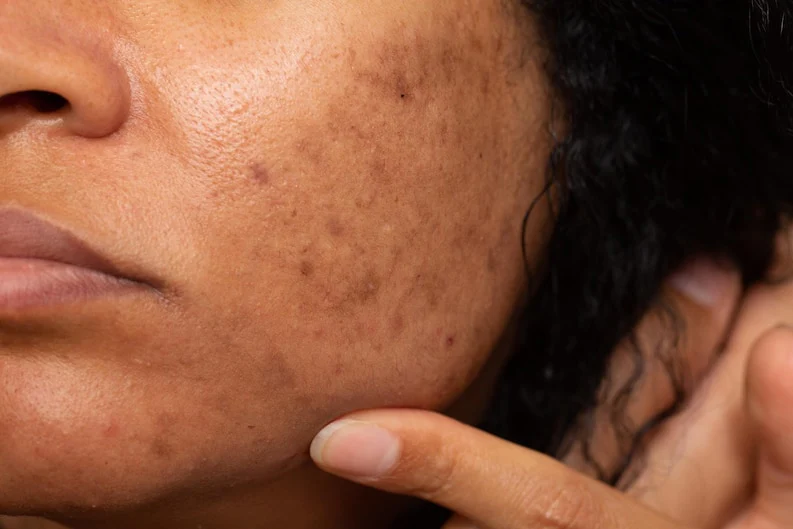Health Benefits of Noni Tea
Overview of Noni
Noni (Morinda citrifolia) is a small evergreen tree found in the Pacific Islands, Southeast Asia, Australia, and India, often thriving in lava flows.
Historically, noni was used to produce red or yellow dyes for clothing and served medicinal purposes, typically applied topically.
Today, various parts of the noni plant, including its fruit, leaves, flowers, stems, bark, and roots, are still utilized in traditional medicine for a wide array of ailments.
However, the effectiveness of these treatments has not been scientifically proven, and the FDA has issued warnings to noni manufacturers regarding unsupported health claims.
Traditional and Modern Uses of Noni
Internal Uses
People take noni orally for numerous conditions, including:
- Colic and Convulsions: Helps to soothe infantile colic and control convulsive episodes.
- Cough and Respiratory Issues: Relieves persistent coughs and respiratory discomfort.
- Diabetes: Manages blood sugar levels.
- Painful Urination and Menstrual Flow: Eases urinary discomfort and stimulates menstrual flow.
- Fever and Liver Disease: Reduces fever and supports liver health.
- Constipation and Digestive Problems: Alleviates constipation and promotes digestive health.
- Vaginal Discharge During Pregnancy: Addresses abnormal discharge during pregnancy.
- Malarial Fever and Nausea: Treats malarial symptoms and nausea.
- Smallpox and Enlarged Spleen: Combats smallpox and reduces spleen enlargement.
- Swelling, Asthma, and Arthritis: Reduces inflammation and treats asthma and arthritis.
- Cancer and Cataracts: Provides support in cancer treatment and eye health.
- Colds, Depression, and Gastric Ulcers: Alleviates cold symptoms, depression, and stomach ulcers.
- High Blood Pressure and Kidney Disorders: Manages hypertension and kidney issues.
- Migraine Headache and Premenstrual Syndrome: Eases migraines and PMS symptoms.
- Stroke, Pain, and Sedation: Helps in stroke recovery, pain relief, and provides sedation.
Noni Juice
The juice of noni fruit is traditionally used to treat:
- Arthritis and Diabetes: Reduces arthritis pain and helps manage diabetes.
- High Blood Pressure and Muscle Aches: Lowers blood pressure and relieves muscle pain.
- Menstrual Difficulties and Headaches: Eases menstrual pain and headaches.
- Heart Disease and AIDS: Supports heart health and provides relief in AIDS management.
- Cancers and Gastric Ulcers: Assists in cancer treatment and heals stomach ulcers.
- Sprains, Depression, and Senility: Treats sprains, depression, and age-related cognitive decline.
- Poor Digestion and Circulation Problems: Enhances digestion and improves blood circulation.
- Atherosclerosis and Drug Addiction: Manages atherosclerosis and aids in drug addiction recovery.
Topical Uses
Noni is also applied to the skin for various purposes:
- Moisturizer and Anti-Aging: Used as a moisturizer and to reduce signs of aging.
- Arthritis and Headaches: Leaves are wrapped around joints for arthritis and applied to the forehead for headaches.
- Burns, Sores, and Wounds: Treats burns, sores, and wounds.
- Abscesses and Infection: A mixture of leaves and fruit is applied to abscesses.
- Stonefish and Stingray Wounds: Root preparations are used on marine wounds.
- Smallpox Salve and Parasite Ointment: Root preparations are used as smallpox salve, and stem ointments treat skin parasites.
Dietary Use
In food, noni fruits, leaves, roots, seeds, and bark are consumed, despite their unpleasant smell and taste.
How Noni Works
Noni contains various substances, including potassium, that may help repair damaged cells, activate the immune system, and provide other health benefits.
Uses of Noni
Traditional and Ethnobotanical Uses
For thousands of years, Polynesian healers have used noni fruits to address a wide range of health issues, including diabetes, high blood pressure, aches, pains, burns, arthritis, inflammation, tumors, aging effects, and infections (parasitic, viral, and bacterial).
Ancient manuscripts highlight the fruit as a key component in natural healing remedies. In modern times, noni is available in various forms such as juice, dried “fruit-leather,” and dry extract capsules.
General Uses
Traditionally, noni has been utilized for treating colds, flu, diabetes, anxiety, high blood pressure, and depression. In Samoan culture, all parts of the noni plant are used to treat various ailments, making it one of the most commonly used medicinal plants in Hawaii. Although some uses have not been confirmed by clinical trials, traditional claims include:
- Bark: Treats bacterial infections, cough, infant diarrhea, and stomach issues.
- Flowers: Used for eye problems (sore eyes, styes, conjunctivitis, ocular inflammation) and coughs.
- Fruit: Treats asthma, wounds, broken bones, mouth and throat infections, tuberculosis, worms, diarrhea, fever, vomiting, eye issues, arthritis, depression, seizures, bacterial and fungal infections, viruses, and serves as a general tonic.
- Fresh Fruit Juice: Used as a remedy for cancer.
- Dried Leaves (Externally): Treats infections, burns, children’s chest colds, and inflammation.
- Dried Leaves (Internally): Used for boils, pleurisy, inflamed gums, and arthritic pain.
- Fresh Leaves (Externally): Used for burns.
- Fresh Leaves (Internally): Treats fevers, hemorrhage, bacterial infections, and inflammation.
- Roots: Treats oral ulcerations, fevers, and cancerous swellings.
Health Benefits of Noni Tea
Noni tea, derived from the leaves of the noni plant (Morinda citrifolia), offers a range of potential health benefits. These benefits are rooted in traditional uses and supported by anecdotal evidence, though scientific validation is still ongoing. Here are the key health benefits associated with noni tea:
1. Anti-Inflammatory Properties
Noni tea contains compounds that may help reduce inflammation. This makes it useful for managing conditions like arthritis and other inflammatory diseases.
2. Immune System Support
Noni tea is believed to boost the immune system. The antioxidants and other active compounds in noni leaves help protect the body from infections and illnesses by enhancing immune response.
3. Digestive Health
Traditionally, noni tea has been used to promote digestive health. It can help alleviate digestive problems, such as constipation, bloating, and stomach aches.
4. Antioxidant Benefits
The antioxidants present in noni tea help combat free radicals in the body, which can reduce oxidative stress and lower the risk of chronic diseases like cancer and heart disease.
5. Pain Relief
Noni tea has analgesic properties, making it effective for relieving pain. It is often used to soothe headaches, joint pain, and general body aches.
6. Detoxification
Regular consumption of noni tea is believed to support detoxification processes in the body, helping to cleanse the liver and improve overall metabolic function.
7. Skin Health
Applying noni tea topically or consuming it can improve skin health. Its anti-inflammatory and antioxidant properties help reduce skin conditions like acne, eczema, and other inflammatory skin issues.
8. Blood Pressure Regulation
Noni tea may help in regulating blood pressure levels, making it beneficial for individuals with hypertension. It promotes better circulation and heart health.
9. Mental Health
Noni tea has been used traditionally to help manage anxiety and depression. The calming effect of the tea can support mental well-being and reduce stress.
10. Energy and Vitality
Consuming noni tea can enhance overall energy levels and vitality. It is believed to improve stamina and reduce fatigue.
Noni tea offers a myriad of potential health benefits, from reducing inflammation and boosting the immune system to promoting digestive health and enhancing skin quality. While more scientific research is needed to fully confirm these benefits, the traditional use of noni tea highlights its valuable role in natural health and wellness practices.
Recommended Dosage
The recommended dosage of noni varies from 30 to 750 mL per day. A dosage of 500 mg extract is considered non-toxic.
Contraindications
Currently, no specific contraindications have been identified for noni.
Pregnancy and Lactation
There is a lack of sufficient information regarding the safety and efficacy of noni during pregnancy and lactation.
Interactions
No well-documented interactions with other medications or substances are known.
Side Effects
There is no comprehensive information available on the adverse reactions to noni.
Toxicology
Potential liver damage has been observed with noni use. Individuals with kidney disease or unexplained elevated potassium levels should exercise caution, as noni may increase potassium levels.
Health Benefits of Blueberries

A graduate of Computer Science and Information Management Technology. Diploma – Caregiving, Certificates – Dementia and Diabetes Awareness and Management. A researcher, blogger, songwriter, singer and acoustic guitarist. Born in an environment where natural talents such as healing are imparted at our natural birth. This natural talents of healing is the result of our genetic inheritance and the training from family environment.











